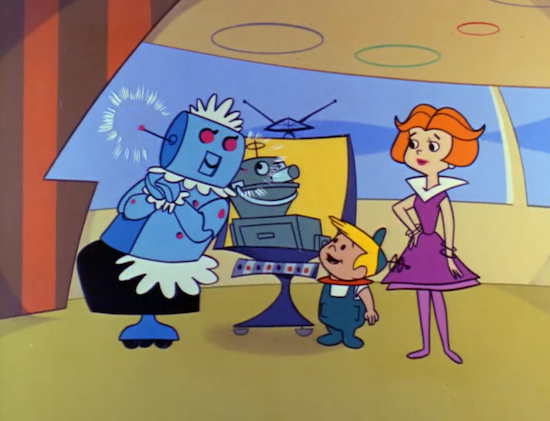Caregivers dream of a Rosie who can do it all, but what about the robots of the real world?
“What I want,” my friend said, tapping her finger on the table for emphasis, “is a robot that will take care of me when I’m older, so that my kids don’t have to. I don’t want them doing that. And maybe it would clean, too, like a Roomba. You know what I mean?” We had been talking about the care support she had provided for her parents, and she was looking ahead to what her own care needs might be in the future.
“Of course,” I said, “I know exactly what you want. You want a Rosie.”
“Yes!” she said, “that’s exactly it.”
For those of us of certain ages, Rosie is the home robot par excellence. Rosie was the family robot imagined on The Jetsons, and she could do anything. As the maid, housekeeper, and friend, Rosie tirelessly took care of the household chores, and she was always there when the family needed her. She didn’t just tolerate the Jetsons’ foibles; she was one of the family herself, with no prior allegiances, say, to some behemoth tech company lurking in the shadows.
This was not the first time I had heard people talk about Rosie in the context of caregiving. The first was in the fall of 2020 during focus groups with unpaid family caregivers. The following exchange emerged during one conversation (participants’ names have been changed) among a group who self-described as interested in technology:
Veronica: What I really want is to live in The Jetsons cartoon. There’s this machine that gets you up in the – got it, right, Michelle? Gets [George Jetson] up in the morning, brings him into the shower, showers and dresses and brings him down, Rosie puts something in the microwave, puts it in front of the plate, and –
Michelle: I want Rosie. Yes, I want Rosie, oh my God.
Michelle went on to provide her perspective on how a robot may have been able to help her with caregiving:
I could’ve kept my job if I’d had a more robust assistant who did not need to be human. I mean, it’s great to have a human, but the robot is 24/7 … reminding [my parent about] medication, answering the phone, reading email ... I just want to be able to oversee things, to manage things remotely better. And the way for me to do that so that I can keep a job would be having a device or some kind of technology that could manage a lot of that day-to-day.
Based on these responses, what can we say makes for a good robot for caregiving? What’s so special about Rosie? She’s good at what she does, and she does it all. She doesn’t just complement the caregiver’s watchful eye: she’s the manager, and she’s on top of things “24/7.” With Rosie in charge, “normal life"—things like full-time work, hobbies, or other relationships—don’t have to be interrupted by caregiving.
Attempts are underway to build a Rosie to support real families and real caregiving situations. Amazon’s Astro, a mobile home monitoring robot, has been called “straight out of The Jetsons.” But none of these efforts have come even close to the magic that is Rosie the Robot: they can’t do it all, and there’s no chance that they will become a manager of the household. Here’s one potential concern for technology developers: the hopes and expectations of caregivers may be so high—and the demands of the role so great—that any attempt at creating a real-world version of Rosie will inevitably fall short.
And another key question remains: inasmuch as caregivers might like to have Rosie, are care recipients ready for her? Darcy, another focus group participant, wasn’t sure if Rosie’s authority would be respected by her care recipient: “I don’t know if my [parent] would listen to a robot. (laughs) My [parent] needs a little bit more encouragement than a robot.”
But if it really were Rosie, a robotic member of the family armed with all the arts of persuasion, you know she would provide all of the encouragement needed. This is, in short, the challenge for future caregiving robots: Rosie sets a high bar – can they meet it?

